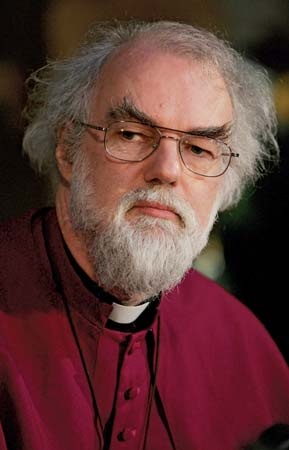Williams, Rowan
archbishop of Canterbury
in full Rowan Douglas Williams
born June 14, 1950, Swansea, Wales
 104th archbishop of Canterbury (from 2002), a noted theologian, archbishop of the Church in Wales (Wales, Church in) (2000–02), and the first archbishop of Canterbury in modern times chosen from outside the Church of England.
104th archbishop of Canterbury (from 2002), a noted theologian, archbishop of the Church in Wales (Wales, Church in) (2000–02), and the first archbishop of Canterbury in modern times chosen from outside the Church of England.Williams was born into a Welsh-speaking family. After attending the Dyvenor Secondary School, he entered Christ's College, Cambridge, where he earned bachelor's and master's degrees in theology; he was awarded a doctorate of philosophy in theology by Wadham College, Oxford, in 1975. After teaching at the College of the Resurrection, Mirfield, he held a series of academic and ecclesiastical appointments, culminating in his professorship of divinity at Oxford (1986–92). He became bishop of Monmouth in 1992 and was enthroned as archbishop of Wales in 2000. His nomination as archbishop of Canterbury in 2002 generated significant controversy because of his liberal views on homosexuality and other matters, though he was supported by stalwarts of the church such as the Reverend Desmond Tutu (Tutu, Desmond). Williams opposed the war against the Taliban regime in Afghanistan in 2001 and harshly criticized the Iraq War in 2003.
Upon assuming office, Williams faced numerous challenges concerning interfaith relations and internal discipline. He made efforts to improve relations between Christians and Muslims, and he strove to maintain good ties with the Roman Catholic church, meeting early in his reign with Pope John Paul II in Rome. Although warmly welcomed by the pope, Williams was cautioned by Rome over the consecration of homosexuals as bishops (Williams himself once ordained an openly gay man). Despite differences, Rome and Canterbury continued to work toward better relations. Williams attended John Paul's funeral in 2005—the first archbishop of Canterbury since the 16th century to do so—and he also attended the installation of Pope Benedict XVI. He visited Benedict at the Vatican in 2006, and they issued a declaration of friendship and continued dialogue while recognizing important differences between the two churches.
Within the Church of England the ordination and consecration of openly homosexual individuals remained a controversial issue that threatened to divide the Anglican Communion (the worldwide association of Anglican churches). In 2003 Williams appointed a special commission to address the matter. The commission also explored how Williams could more effectively implement his moral authority over the communion of churches. The issue, however, continued to trouble the church and its archbishop in the following years, as the Episcopal church in America ordained homosexuals, including an openly gay man as bishop, while the Anglican church in Africa staunchly opposed the practice.
In 2008 Williams faced further controversy when he suggested that the English legal system should adopt parts of Sharīʿah, or Islamic law, as a means to promote social cohesion. He argued that Muslims in England might feel more comfortable addressing financial or marital issues in a Sharīʿah court than in a secular court. Although Williams found support among members of the church hierarchy who recognized his right to raise the matter even if they disagreed with his opinion, others interpreted his remarks as undermining the long tradition of English secular law.
A fellow of the British Academy since 1990, Williams has published collections of articles, sermons, and poetry. He is the author of On Christian Theology (2000), Arius: Heresy and Tradition (2002), Writing in the Dust: After September 11 (2002), and Tokens of Trust: An Introduction to Christian Belief (2007).
- Yale University
- Yalong River
- Yalow, Rosalyn S.
- Yalta
- Yalta Conference
- Yalu River
- yam
- Yama
- yama
- Yamaga Sokō
- Yamagata
- Yamagata Aritomo
- Yamaguchi
- Yamalo-Nenets
- Yamal Peninsula
- Yamamoto Gonnohyōe, Count
- Yamamoto Isoroku
- Yamana Mochitoyo
- Yamanashi
- Yama-no-kami
- Yamanouchi family
- Yamanoue Okura
- Yamasaki, Minoru
- Yamasee War
- Yamashita Tomoyuki